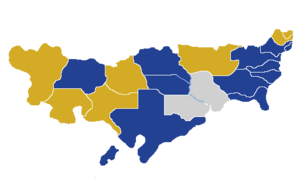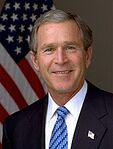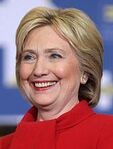2020 Newreath Republican Party Primaries: Difference between revisions
m (→March 2020) |
mNo edit summary |
||
| Line 96: | Line 96: | ||
The 2020 U.S. Republican Party presidential primaries are a series of electoral contests organized by the Republican Party of [[Newreath]] to select the 550 delegates to the 2020 Republican National Convention in Hennessee. Those delegates shall elect the Republican nominee for President of the United States, with that nominee being the party's official candidate for President. If a candidate amasses at least 276 delegates by the RNC convention, they will be considered the presumptive nominee. The elections began in February 2020 and will continue until the convention in April. The primary elections occur in all 20 states of the Union as well as the federal capital district of Baxter. | The 2020 U.S. Republican Party presidential primaries are a series of electoral contests organized by the Republican Party of [[Newreath]] to select the 550 delegates to the 2020 Republican National Convention in Hennessee. Those delegates shall elect the Republican nominee for President of the United States, with that nominee being the party's official candidate for President. If a candidate amasses at least 276 delegates by the RNC convention, they will be considered the presumptive nominee. The elections began in February 2020 and will continue until the convention in April. The primary elections occur in all 20 states of the Union as well as the federal capital district of Baxter. | ||
Overall, there were 5 major Republican presidential candidates in the 2020 election. As of February 28th, 2020, 3 candidates have dropped out of the race, and only two major candidates are still seeking the nomination: Christopher Dawson (Governor of Austin) and Charlotte Reynolds (Senator of Hamilton). | Overall, there were 5 major Republican presidential candidates in the 2020 election. As of February 28th, 2020, 3 candidates have dropped out of the race, and only two major candidates are still seeking the nomination: [[Christopher Dawson]] (Governor of Austin) and Charlotte Reynolds (Senator of Hamilton). | ||
==Timeline== | ==Timeline== | ||
Revision as of 22:06, 15 March 2020
| |||||||||||||||||
410 206 votes needed to win | |||||||||||||||||
|---|---|---|---|---|---|---|---|---|---|---|---|---|---|---|---|---|---|
| |||||||||||||||||
 States won by March 2020 | |||||||||||||||||
| |||||||||||||||||
The 2020 U.S. Republican Party presidential primaries are a series of electoral contests organized by the Republican Party of Newreath to select the 550 delegates to the 2020 Republican National Convention in Hennessee. Those delegates shall elect the Republican nominee for President of the United States, with that nominee being the party's official candidate for President. If a candidate amasses at least 276 delegates by the RNC convention, they will be considered the presumptive nominee. The elections began in February 2020 and will continue until the convention in April. The primary elections occur in all 20 states of the Union as well as the federal capital district of Baxter.
Overall, there were 5 major Republican presidential candidates in the 2020 election. As of February 28th, 2020, 3 candidates have dropped out of the race, and only two major candidates are still seeking the nomination: Christopher Dawson (Governor of Austin) and Charlotte Reynolds (Senator of Hamilton).
Timeline
December 2019
The 2020 Republican Presidential Primaries kicked off on Dec 6th 2019 when Congressman Max Lane of Lauderdale's 3rd District announced his intentions to run for President. Lane is a strong supporter of former republican presidential nominee, businessman and millionaire Charles Hanley, who lost the presidential election in 2016 to now-President George Carter of the Liberal Party. Hanley, and since then Max Lane, has been considered brash and politically incorrect but have loyal bases of support.
Shortly after, on 7th Dec 2019, Governor Christopher Dawson fueled speculation about a presidential run when he made the trip form his home state of Austin to the capital, Baxter, for a meeting with Senate Republicans. That evening, fmr. Secretary of the Interior Holly Pearson announced her candidacy for the republican nomination.
2 weeks later, on Dec 23rd, Governor Logan Foster of Sterling announced his candidacy for the republican nomination. The Governor made his announcement at the Governor's annual Christmas Ball in the Governor's mansion. This was largely criticised later as the event was exclussive and had several millionaires and billionaires on the guest list.
January 2020
Jan 1st 2020 saw Senator Charlotte Reynolds of Hamilton announce her candidacy infront of a 4,000 large rally in her home state of Hamilton.
On Jan 15th outside the State Legislature in Austin and surrounded by republican state legislatures and national republican congressmen/women and Senators, and infront of an 5,000 large rally, Governor Christopher Dawson announced his intention to seek the republican nomination for President of Newreath.
On Jan 29th, the Republicans held their first debate which was seen as a major victory for both Governor Dawson, who emerged the clear front runner, and Senator Reynolds, who until then had been relatively unknown outside of the western states.
February 2020
The first state to vote in the primaries is Nunavik on 1st February 2020. Nunavik is regarded as a state which is generally representative of the country as a whole in terms of demographics. The Republican field this election cycle started off with 5 candidates; Congressman Max Kane of Lauderdale, Senator Charlotte Reynolds of Hamilton, Governor Logan Foster of Sterling, former Secretary of the Interior Holly Pearson and Governor Christopher Dawson. The candidates come from a diverse political background ranging from Senator Reynolds who only entered public office 2 years ago when she was elected Senator, to Governor Dawson, the two-term Governor of Austin who is also the eldest son of former 2-term President Michael Dawson.
The Republicans held their second debate on Feb 6th. Dawson emerged the victor with Reynolds close behind. At this point, even with only one primary election having occurred, it was becoming obvious that the race was becoming a 2-way race between Senator Reynolds andd Governor Dawson.
Governor Dawson was seen as the front-runner with name recognition and establishment support. Dawson secured his place as the front-runner in the first primary election when he swept the state of Nunavik with over 55% of the vote. Congressman Max Kane of Lauderdale had to suspend his campaign the day after the Nunavik primary after he finished last with less than 2000 votes. A day later, Governor Foster also suspended his campaign citing his poor showing in the Nunavik Primary and his relatively empty war chest.
The Republicans held their third debat eon Feb 20th, just two days before mega-saturday. It was a three-way debate between Governor Dawson, Secretary Pearson and Senator Reynolds. Reynolds was seen as the victor in the debate with Dawson underperforming. However, Pearson suffered the worst with a devastating night after she faced repeated attacks from both Dawson and Reynolds over her immigration policies in the 2000s when she was Interior Secretary.
Feb 22nd saw the mega-saturday primary elections where 5 states voted. Fmr. Secretary Pearson suspended her campaign after she failed to win any states of the states and after repeated poor debate showings.
March 2020
With the race in its third month, only Austin Governor Dawson and Hamilton Senator Reynolds remained. Dawson, the front-runner and establishment favourite, had received the endorsements of all the former candidates, except congressman Kane, by March 3rd and was seeing establishment figures rally behind him whilst Senator Charlotte Reynolds continues to grow her grass-roots campaign. Whilst Reynolds had appeared a serious contender in February, Dawson's early victories cemented his lead as the front runner and he held a large lead in the delegate count. As a result, even though Reynolds was still polling relatively high, many had written Reynolds off because she hadn't won any states. This was until she won the state of Lauderdale on March 8th; the most populous state in the nation. This then gave Reynolds the momentum which helped her win the states of Berkshire and Cascadia on March 12th.
Both Dawson and Reynolds are relatively moderate-conservatives which is a clear sign that the party has moved away from the more right-wing position that it held in 2016; an election that saw Carter and his liberal party decimate the Republicans across the country in the Presidential, House and Senate elections. In another sign that the party has become more centrist and moderate, in the Nunavik Primary, republican voters decisively turned away from the rhetoric and policies of Congressman Kane, a remnant of the more right-wing side of the party. By this point in the race it became clear that the republican party is taking a more centre-right position with a focus on policy rather than heated rhetoric and personality. Both Dawson and Reynolds signed pledges to not run dirty ads or make personal attacks. They have both also stated that they will support whichever of them becomes the party's nominee.
The Republican Party held its third primary debate on February 15th at Hennessee State University's St. Bernards Campus. The debate focused on foreign policy, specifically the nation's current isolationist policy, as well as economic policy, a hot topic in this election cycle. Both candidates declared their opposition to the current isolationist policy being enforced by President Carter. Governor Dawson has repeatedly called for Newreath to return to its leading role in global affairs as a police presence to ensure human rights, civil liberties and the rule of law are protected and enshrined globally. Whilst Senator Reynolds agreed with Governor Dawson that Newreath needs to return to the world stage as an active nation in global affairs, she opposed Governor Dawson's pro-interventionist stance. Instead, Senator Reynolds touted her policy of 'soft power' in which she intends to use the military alongside the diplomatic corps to push forward a pro-democracy agenda. Republican voters polled after the debate are said to have favoured Governor Dawson's position whilst independents and Liberal Party voters preferred Senator Reynolds position.
The second half of the debate was focused on economics. Governor Dawson touted his tax break that he introduced in the state of Austin in which businesses saw their taxes slashed in half from 40% to 20%. Dawson has stated that he will introduce a similar tax break nationally if elected President and that he would extend tax breaks to the middle class. Senator Reynolds has supported a more incremental tax break for businesses with small businesses getting much larger tax breaks (10%) compared to big businesses only having their taxes cut to 30%. Reynolds instead focused on greater income tax breaks with across the board reductions and a reduction in VAT. Republican voters, on this issue, are almost evenly split with just a slight advantage to Reynolds. Liberal and independent voters are against both Dawson's and Reynolds' plans as they're seen as a major break for big business and the wealthy.
Dawson's nation wide lead over Reynolds has decreased since March 12th after a strong showing from Reynolds in the last debate and her victories in the States of Calhoun, Hamilton, Sterling and Crawford in the West-Friday Primary Votes. Senator Reynolds defeated Governor Dawson on West-Friday when she took away the majority of the delegates on offer that night. Dawson's campaign stated that it was a minor setback but pointed to their still sizable lead in the delegate count. The victories ensured Reynolds campaign could continue because if Dawson had picked up either Calhoun or Crawford as well as his victories in Hamilton and North and South Douglas, then he would have secured the 206 delegates needed to become the nominee.
It is crucial that Senator Reynolds wins the Tuesday 17th primary vote in Hennessee if she wishes to remain in the race. If she fails to win the State of Hennessee, Governor Dawson will reach the needed 206 delegate count and become the Republican Nominee.
Dawson currently has an average of 39% support from Republican voters, Reynolds has 35% and the rest are undecided. The next republican primary is on Tuesday 17th March when the general election battleground state of Hennessee will award its 38 delegates.



